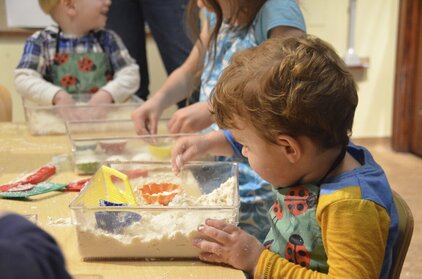 Occupational therapy can help to improve a child’s motor, cognitive, sensory processing, communication, and play skills. The goal of pediatric OT is to enhance development, minimize the potential for developmental delay, and help families to meet the special needs of their infants, toddlers and school-age children. Understanding child development delays The first three years of any child’s life are a critical time for brain development. During this busy period of cognitive, social and physical growth, children learn so much about how to interact with the millions of new stimuli occurring each and every day of their lives. From learning to crawl, walk, speak, listen, grasp, self-feed, self-dress, and how to play with toys, children are tasked with learning a lot in a very short time and they are constantly absorbing how to appropriately interact physically, emotionally and verbally with the world around them. Children who may be experiencing subtle-to-severe cognitive, social or physical delays will usually begin showing signs of these at any point between the ages of 0-4. If a child’s developmental delays are more subtle and nuanced, a pediatrician or infant and toddlers specialist may recommend a thorough battery of evaluations that includes an occupational therapy screening for concerned parents and caregivers. Why is an OT evaluation recommended? Occupational therapy is intended to treat a variety of problems associated with conditions resulting from birth injuries or defects, sensory processing disorders, traumatic brain or spine injuries, learning disabilities, autism, rheumatoid arthritis, mental or behavioral problems, orthopedic injuries, post-surgical conditions, injuries, and other chronic illnesses. An occupational therapy (OT) evaluation is one that is completed by a licensed occupational therapist (OTL/R) to assess a child's gross motor, fine motor, visual motor, visual perceptual, handwriting, daily living and sensory processing skills. OT professionals use a group of standardized assessment tools, non-standardized assessment tools, parent interview and clinical observations to assess a child's performance. The results of a formal OT evolution can help better determine things like how well a child’s hands work together, if the child processes what he sees, hears, feels, etc. and produces an appropriate response and even if the child is able to calm themselves or adapts to their environment. These types of sensory integrative issues can exacerbate the child’s development and be a reason for observed delays. What to expect at an OT evaluation The occupational therapist performing an evaluation on a child will determine a baseline for abilities and then perform play-based evaluations that include both standardized and clinical observations with the child performing functional skills. These vary by provider, but might include screening ball play, fine motor play, visual motor tasks, visual perception skills, gross motor tasks, self-care skills (eating, getting dressed), social interaction and visual processing skills. Once assessments are completed, the OT will summarize all information gathered and present the clinical impressions and recommended treatment goals that will best address any identified concerns. Often, this report will a time frame for the recommended treatment plan before a reassessment is warranted. If routine occupational therapy is recommended, the length of time and expectations will vary based on your child’s individualized therapeutic goals. How OT helps young learners A child who may be exhibiting delays with developing fine motor skills – i.e. those involving the small hand muscles – can work with an OT to improve strength, motor control and dexterity. Without these skills, kids will have difficulty drawing, using scissors and stringing beads. These types of delays are detrimental, especially for elementary academics, because seemingly easy tasks like turning pages, writing, using a computer, may be that much harder. Occupational therapists help children by working closely with them to learn skills that will foster independence and enable participation in daily activities, such as self-care, play and learning. An occupational therapist can also help to establish effective routines and break down information into steps that the child with delays will be able to follow. Occupational therapists can also help children diagnosed with sensory issues. For example, hypersensitive children (those prone to feeling “sensory overload”) can learn to better self-regulate in uncomfortable environments or advocate for themselves when they need beaks or quiet accommodations to learn. To help sensory seekers (those who seek a higher level of sensory arousal and regulation), OTs focus on teaching them ways to self-regulate using activities like swinging, crashing onto huge bean bags, and jumping on trampolines in areas known as “sensory gyms.” Learning these skills and practicing them at regular intervals can help children be able to sit and focus when it’s time to learn. Gross motor developmental delays can be addressed by the OT using exercises and activities to promote balance, coordination, strength, and endurance. These skills have a direct impact on how children walk, run, go up stairs, jumping, catching and other skills that will enable them to successfully participate in sports and recess activities – which are crucial elements for building social emotional strengths and self-esteem. How to get an OT evaluation While medical coverage may vary, many health insurance plans cover occupational therapy evaluations and services. Kinera Foundation provides occupational therapy (OT) services for children, teens and adults with disabilities and special health care needs. If you are concerned about your child's development, or your child is showing signs of or has been diagnosed with a sensory processing issues, please call for a confidential meeting and evaluation: 443-249-3126.
7 Comments
12/21/2021 11:19:26 pm
It's good to know that by working closely with them, occupational therapists help children to learn skills that will encourage independence and allow engagement in daily activities, such as self-care, play, and learning. I'm not sure if I'm just overreacting, but I sometimes notice my son exhibiting delays with developing his fine motor skills. If bringing him to an occupational therapy center will help my son, then I'll immediately look for one in our area.
Reply
12/28/2021 06:11:09 pm
Thank you for explaining that occupational therapy can address gross motor developmental delays through exercises and activities that will promote balance, coordination, strength, and endurance. We just recently found at that my son has gross motor developmental delays. If going through occupational therapy can help my son successfully participate in physical activities, then I will make sure to look for a clinic near our place that provides occupational therapy services.
Reply
1/5/2022 10:11:19 am
I want to make sure that my son develops properly. It makes sense that proper occupational therapy would be important. I'll be sure to get a professional to help out with things. That seems like a good way to ensure that he doesn't get any physical issues.
Reply
1/29/2022 12:36:57 am
It got me when you said that children who experience delays in development may be helped by professionals through occupational therapy. My husband and I want our only son to excel and develop his skills even at a young age. With this, we will look for a pediatric therapy center on Monday that can encourage learning in a safe and clean environment.
Reply
7/13/2022 09:51:07 pm
Some kids have trouble doing tasks that call for dexterity, control, and strength in the tiny hand muscles. According to the Child Mind Institute, children who struggle with fine motor skills will find it challenging to do tasks like cutting with scissors, sketching, stringing beads, and using utensils. A youngster with delays in this area may struggle to accomplish necessary tasks like writing and using computers at school if fine motor ability difficulties are not addressed.
Reply
Leave a Reply. |
AuthorWrite something about yourself. No need to be fancy, just an overview. Archives
June 2022
Categories
All
|
|
Kinera Foundation
115 Sallitt Dr., Suite C Stevensville, MD 21666 (Chesapeake Bay Business Park) Phone: 443-249-3126 Fax: 443-458-0446 Kinera Foundation is a 501(c)(3) Nonprofit organization |
|
Copyright © 2024
Kinera Foundation, Inc. All rights reserved |
|
|
|
